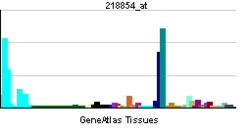- DSE (gene)
-
Dermatan sulfate epimerase Identifiers Symbols DSE; DSEPI; SART2 External IDs OMIM: 605942 MGI: 2443455 HomoloGene: 8354 GeneCards: DSE Gene EC number 5.1.3.19 Gene Ontology Molecular function • isomerase activity
• chondroitin-glucuronate 5-epimerase activityCellular component • endoplasmic reticulum
• Golgi apparatus
• membrane
• integral to membraneBiological process • dermatan sulfate biosynthetic process Sources: Amigo / QuickGO RNA expression pattern 
More reference expression data Orthologs Species Human Mouse Entrez 29940 212898 Ensembl ENSG00000111817 ENSMUSG00000039497 UniProt Q9UL01 Q8BLI4 RefSeq (mRNA) NM_001080976.1 NM_172508.2 RefSeq (protein) NP_001074445.1 NP_766096.1 Location (UCSC) Chr 6:
116.58 – 116.76 MbChr 10:
33.87 – 33.93 MbPubMed search [1] [2] Dermatan-sulfate epimerase is an enzyme that in humans is encoded by the DSE gene.[1][2][3][1][2]
The protein encoded by this gene is a tumor-rejection antigen. This antigen possesses tumor epitopes capable of inducing HLA-A24-restricted and tumor-specific cytotoxic T lymphocytes in cancer patients and may be useful for specific immunotherapy. This gene product is localized to the endoplasmic reticulum. Two transcript variants encoding the same protein have been found for this gene.[3]
References
- ^ a b Sasatomi T, Suefuji Y, Matsunaga K, Yamana H, Miyagi Y, Araki Y, Ogata Y, Itoh K, Shirouzu K (Mar 2002). "Expression of tumor rejection antigens in colorectal carcinomas". Cancer 94 (6): 1636–41. doi:10.1002/cncr.10421. PMID 11920522.
- ^ a b Maccarana M, Olander B, Malmstrom J, Tiedemann K, Aebersold R, Lindahl U, Li JP, Malmstrom A (Apr 2006). "Biosynthesis of dermatan sulfate: chondroitin-glucuronate C5-epimerase is identical to SART2". J Biol Chem 281 (17): 11560–8. doi:10.1074/jbc.M513373200. PMID 16505484.
- ^ a b "Entrez Gene: DSE dermatan sulfate epimerase". http://www.ncbi.nlm.nih.gov/sites/entrez?Db=gene&Cmd=ShowDetailView&TermToSearch=29940.
Further reading
- Nakao M, Shichijo S, Imaizumi T et al. (2000). "Identification of a gene coding for a new squamous cell carcinoma antigen recognized by the CTL". J. Immunol. 164 (5): 2565–74. PMID 10679095.
- Tanaka S, Tsuda N, Kawano K et al. (2001). "Expression of tumor-rejection antigens in gynecologic cancers". Jpn. J. Cancer Res. 91 (11): 1177–84. PMID 11092984.
- Strausberg RL, Feingold EA, Grouse LH et al. (2003). "Generation and initial analysis of more than 15,000 full-length human and mouse cDNA sequences". Proc. Natl. Acad. Sci. U.S.A. 99 (26): 16899–903. doi:10.1073/pnas.242603899. PMC 139241. PMID 12477932. http://www.pubmedcentral.nih.gov/articlerender.fcgi?tool=pmcentrez&artid=139241.
- Mungall AJ, Palmer SA, Sims SK et al. (2003). "The DNA sequence and analysis of human chromosome 6". Nature 425 (6960): 805–11. doi:10.1038/nature02055. PMID 14574404.
- Ota T, Suzuki Y, Nishikawa T et al. (2004). "Complete sequencing and characterization of 21,243 full-length human cDNAs". Nat. Genet. 36 (1): 40–5. doi:10.1038/ng1285. PMID 14702039.
- Gerhard DS, Wagner L, Feingold EA et al. (2004). "The Status, Quality, and Expansion of the NIH Full-Length cDNA Project: The Mammalian Gene Collection (MGC)". Genome Res. 14 (10B): 2121–7. doi:10.1101/gr.2596504. PMC 528928. PMID 15489334. http://www.pubmedcentral.nih.gov/articlerender.fcgi?tool=pmcentrez&artid=528928.
- Kimura K, Wakamatsu A, Suzuki Y et al. (2006). "Diversification of transcriptional modulation: Large-scale identification and characterization of putative alternative promoters of human genes". Genome Res. 16 (1): 55–65. doi:10.1101/gr.4039406. PMC 1356129. PMID 16344560. http://www.pubmedcentral.nih.gov/articlerender.fcgi?tool=pmcentrez&artid=1356129.
Categories:- Human proteins
- Chromosome 6 gene stubs
Wikimedia Foundation. 2010.
